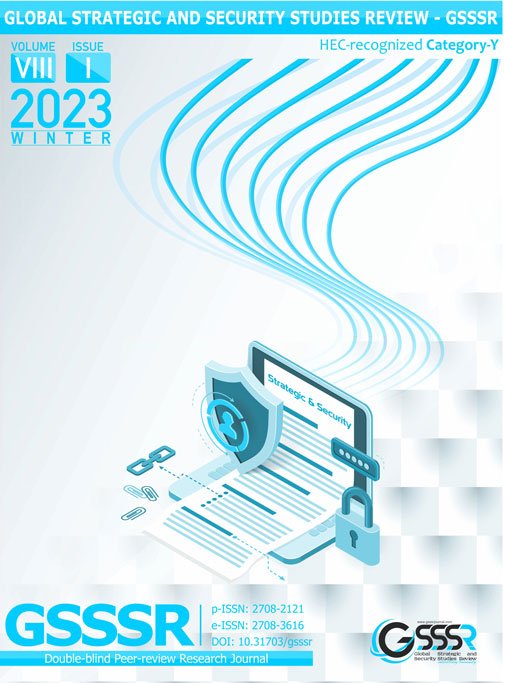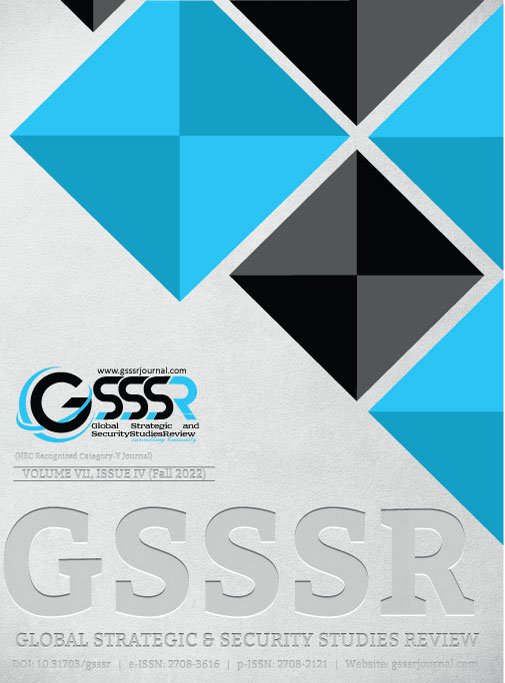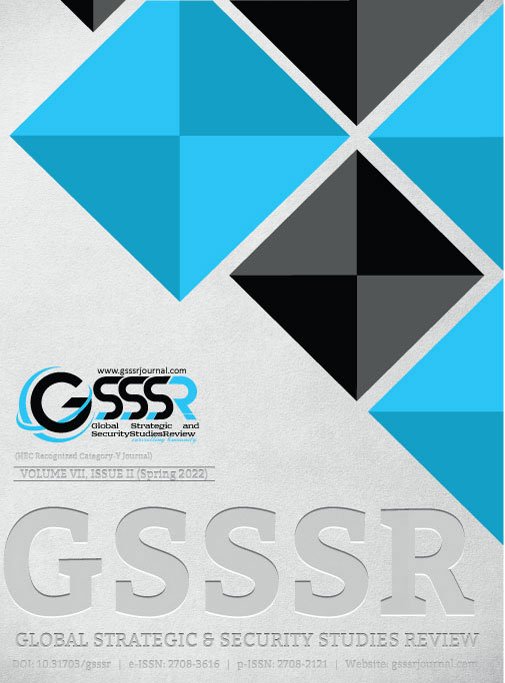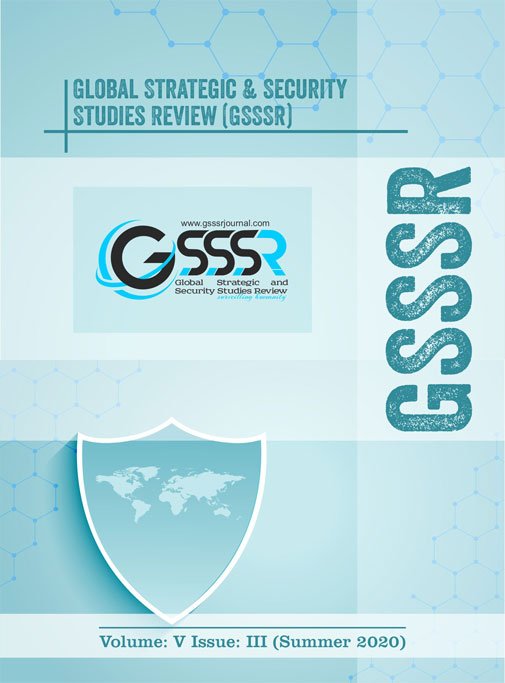01 - The Hydropolitics of the Indus Waters Treaty: A Critical Perspective
http://dx.doi.org/10.31703/gsssr.2020(V-IV).0110.31703/gsssr.2020(V-IV).01 Published : Dec 2020
-
This paper discusses the hydro politics of the Indus Waters Treaty from a critical perspective. Many analysts and commentators from both India and Pakistan expressed displeasure with the treaty on the grounds of allotting more waters to the contending party. The Indian side is displeased with 'restricted' rights on western rights, whereas the Pakistani side laments the Indian rights on the western... Details
-
Hydropolitics, India, Indus Waters Treaty, Pakistan
-
(1) Muhammad Imran Mehsud
Assistant Professor, Department of Political Science, Hazara University, Mansehra, KP, Pakistan.
(2) Malik Adnan
Assistant Professor, Department of Media Studies, The Islamia University of Bahawalpur, Punjab, Pakistan.
(3) Azam Jan
Assistant Professor, Department of Communication and Media Studies, Hazara University, Mansehra, KP
02 - International Misperceptions about Pakistan's Nuclear Security
http://dx.doi.org/10.31703/gsssr.2020(V-IV).0210.31703/gsssr.2020(V-IV).02 Published : Dec 2020
-
This paper aims to outline the international misperception about Pakistan's nuclear programme and analyses the origins of each critique, but also the measures Pakistan has put in place to rectify it. Furthermore, some issues will remain, but remain issues for all states with nuclear weapons and are not unique to Pakistan. These cases are outlined, and it is argued that these should be seen as inte... Details
-
Nuclear Weapons, Pakistan, Security, International Perception
-
(1) Muhammad Rehman
Lecturer, Department of Arts & Media, Foundation University, Islamabad, Pakistan.
(2) Tahir Mahmood Azad
Visiting Research Fellow, Centre for Science & Security Studies (CSSS), War Studies Department, King's College London.
03 - Understanding Terrorism: A Review of the Psychosocial Theories
http://dx.doi.org/10.31703/gsssr.2020(V-IV).0310.31703/gsssr.2020(V-IV).03 Published : Dec 2020
-
Terrorism is a cause of uncertainty, fear, and damage for a country. Mostly represented stereotypically, terrorists are the reason for civil unrest worldwide. However, there are different approaches to describe the personality traits of a terrorist still this matter is highly debatable. This study aims to address terrorism from a psycho-social perspective. By describing the background dynamics of ... Details
-
Terrorism; Social Cognitive Approach; Behaviorism: Stereotyping; Symbolization
-
(1) Arif Jameel
School of Public Affairs, Zhejiang University, Hangzhou, China.
(2) Riaz Ahmad
Assistant Professor, School of Public Policy and Administration, Xian Jiaotong University, China.
(3) Mudassir Mehdi
Islamia University Bahawalpur, Punjab, Pakistan.
04 - An Assessment of Right to Fair Trial Under the Constitution of Pakistan, 1973: A
http://dx.doi.org/10.31703/gsssr.2020(V-IV).0410.31703/gsssr.2020(V-IV).04 Published : Dec 2020
-
Right to fair trial is considered as the basic right affirmed by Islam and recognised by different international documents i.e., ICCPR, UDHR, etc. In Pakistan, the notion of fair trial has been incorporated through Article 10-A through 18th constitutional amendment. The two amendments were made in the US Constitution in 18th and 19th century i.e., 6th and 14th amendments which safeguards right to ... Details
-
Fair Trial, Constitution, Pakistan, Fundamental Right, Public Trial, Counsel, Equal Protection
-
(1) Bakht Munir
University Law College, University of the Punjab, Quaid-i-Azam Campus, Lahore, Punjab, Pakistan.
(2) Ali Nawaz Khan
University Law College, University of the Punjab, Quaid-i-Azam Campus, Lahore, Punjab, Pakistan.
(3) Naveed Ahmed
University Law College, University of the Punjab, Quaid-i-Azam Campus, Lahore, Punjab, Pakistan.
05 - Evaluating China's Soft Power Discourse: Assumptions, Strategies, and Objectives
http://dx.doi.org/10.31703/gsssr.2020(V-IV).0510.31703/gsssr.2020(V-IV).05 Published : Dec 2020
-
China claims that it's rise is different from other great powers: a benign and responsible power striving for just order and peaceful development. This paper raises question that why has China resorted to soft power mechanisms? What are the strategies that it employs to project soft image? And finally, how is soft power helpful in portraying China as a power distinct from the status quo powers? Wh... Details
-
Aid Diplomacy, Confucianism, Cultural Diplomacy. Discourse, Peaceful Development, Soft Power
-
(1) Muhammad Nadeem Mirza
Faculty Member, School of Politics and International Relations, Quaid-i-Azam University Islamabad. Pakistan.
(2) Hussain Abbas
PhD scholar, School of Politics and International Relations, Quaid-i-Azam University, Islamabad. Pakistan. (Faculty Member, The Islamia University of Bahawalpur, Punjab, Pakistan)
(3) Muhammad Qasim Nizamani
Faculty Member, Department of Media & Communication Studies, University of Sindh, Jamshoro, 76080, Sindh, Pakistan.

 Volume IX, Issue III (Summer 2024)
Volume IX, Issue III (Summer 2024)  Volume IX, Issue II (Spring 2024)
Volume IX, Issue II (Spring 2024)  Volume IX, Issue I (Winter 2024)
Volume IX, Issue I (Winter 2024)  Volume VIII, Issue IV (Fall 2023)
Volume VIII, Issue IV (Fall 2023)  Volume VIII, Issue III (Summer 2023)
Volume VIII, Issue III (Summer 2023)  Volume VIII, Issue II (Spring 2023)
Volume VIII, Issue II (Spring 2023)  Volume VIII, Issue I (Winter 2023)
Volume VIII, Issue I (Winter 2023)  Volume VII, Issue IV (Fall 2022)
Volume VII, Issue IV (Fall 2022)  Volume VII, Issue III (Summer 2022)
Volume VII, Issue III (Summer 2022)  Volume VII, Issue II (Spring 2022)
Volume VII, Issue II (Spring 2022)  Volume VII, Issue I (Winter 2022)
Volume VII, Issue I (Winter 2022)  Volume VI, Issue IV (Fall 2021)
Volume VI, Issue IV (Fall 2021)  Volume VI, Issue III (Summer 2021)
Volume VI, Issue III (Summer 2021)  Volume VI, Issue II (Spring 2021)
Volume VI, Issue II (Spring 2021)  Volume VI, Issue I (Winter 2021)
Volume VI, Issue I (Winter 2021)  Volume V, Issue IV (Fall 2020)
Volume V, Issue IV (Fall 2020)  Volume V, Issue III (Summer 2020)
Volume V, Issue III (Summer 2020)  Volume V, Issue II (Spring 2020)
Volume V, Issue II (Spring 2020)  Volume V, Issue I (Winter 2020)
Volume V, Issue I (Winter 2020)  Volume IV, Issue I (Fall 2019)
Volume IV, Issue I (Fall 2019)  Volume III, Issue I (Fall 2018)
Volume III, Issue I (Fall 2018)  Volume II, Issue I (Fall 2017)
Volume II, Issue I (Fall 2017)  Volume I, Issue I (Fall 2016)
Volume I, Issue I (Fall 2016)